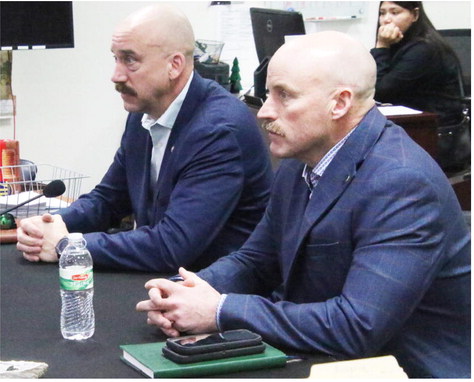ing old-guard political figures, including ….
ing old-guard political figures, including former Republican Gov. Marc Racicot and Dorothy Bradley, a longtime Democratic lawmaker who narrowly lost to Racicot in the 1992 election for governor.
Buchanan, who founded Billings financial planning firm Buchanan Capital, argues there’s “an eight-lane highway” down the middle of Montana politics with plenty of space for an independent candidate to make electoral inroads. He said in an interview that he’s hearing a lot of frustration about how Democrat- backed spending has overstimulated the economy, driving inflation. At the same time, he faults Rosendale for leaning into “a theme of fear” on topics like border control.
“I think his rhetoric creates an advantage for me, who’s trying to appear more moderate,” Buchanan said. “I think I’m a better listener. I just don’t think Montana is where he’s at.”
Buchanan cited Rosendale’s outlier stance as one of only three Republicans opposing the pro-Ukraine resolution in March as the deciding factor in his decision to file for office. He also said he believes Rosendale’s policy record compares poorly to Montana’s U.S. senators.
“Daines and Tester can actually talk about the things that they’re doing. I don’t hear those things from Rosendale. I see negativity and attacks,” Buchanan said.
Rosendale’s campaign and the Montana GOP have responded to Buchanan’s candidacy by dismissing him as a Democrat in independent clothing. They’ve also argued that voters should discount Buchanan’s endorsement by Racicot, who was Montana’s governor from 1993 to 2001 and then served as chair of the Republican National Committee under President George W. Bush, because the former governor has in recent years become vocally anti-Trump.
“Attempting to tout the endorsement of Governor Racicot to appear more moderate proves that Buchanan would just be another vote for Biden, Pelosi, and Schumer if elected,” the Montana GOP said in an April 8 release, referring to the president, Speaker of the House Nancy Pelosi and Senate Majority Leader Chuck Schumer, all Democrats.
Buchanan told MTFP last month that he’ll decide which party to caucus with in Congress after the election if his campaign is successful.
According to campaign finance records available through the Montana Commissioner of Political Practices and the Federal Elections Commission, Buchanan has donated to both Democratic and Republican candidates. His history includes a $1,000 donation to Tester’s 2006 Senate campaign, $500 to Democratic Sen. Max Baucus’s 2002 re-election campaign, and $250 to Democrat Brian Schweitzer’s 2000 U.S. Senate bid. Buchanan also gave donations totalling $1,600 to Republican Greg Gianforte in 2016 and $100 to Republican Rick Hill in 2012 during their respective runs for governor against Democrat Steve Bullock.
Additionally, FEC records indicate that Buchanan’s wife, Norma, donated $100 through the ActBlue platform this year to Western district Democratic U.S. House candidate Monica Tranel.
In order to qualify for the ballot without a party affiliation, Buchanan needs to gather 8,722 voter signatures by May 31. He said May 16 that he thinks “we’ve got a real good shot to get on” the ballot, but that he expects his volunteers will be working “right up to the deadline.”
Is Purple Still Possible?
Whether any of Rosendale’s challengers will find the traction to sell Eastern district voters on their more centrist visions for Montana politics is perhaps the district’s defining political question as the candidates campaign through the June 7 primary toward the Nov. 8 general election.
Buchanan acknowledged that the initial support his campaign is finding is largely among older voters in Billings and Helena, many of them long-term residents in their 50s, 60s and 70s who look back on Montana’s historically purple politics with a touch of nostalgia. If he makes the ballot, he said, his biggest challenge will be reaching out into rural areas and winning support from younger voters.
Ronning, for her part, argued that it’s a mistake to assume the Republican Party has an unshakable hold on the district.
“Historically, eastern Montana, and Montana in general, has always voted for a person over a party,” she said, citing the political success of Democrats like Baucus, Tester, Schweitzer and Bullock. “We’ve never just voted straight party. That’s just not who Montana is.”
She acknowledged that Trump-style politics have appeal for many of the district’s voters, saying she believes usversus- them messaging can attract people when they’re struggling financially, or facing challenges like drought or medical issues that can make them feel like they’ve lost control of the problems in their lives.
“A message that’s going to appeal to people is, ‘Your problems are the result of that group over there,’” she said.
“The reality is that messaging pits American against American,” she said. “And we are not each others’ enemy. We are each others’ solution. We are each others’ neighbor.”
As neighbors from across eastern Montana head to the polls this year, they’ll have a chance to decide whether the bipartisan idealism expressed by Ronning, Buchanan and the other Rosendale challengers still has a toehold on the Montana plains. Or, alternatively, to prove the incumbent correct in his belief that a critical mass of Montana voters are in fact hungry above all else this year for his brand of dependable partisanship.
“I am representing the state exactly how my constituents expect me to,” Rosendale said.

